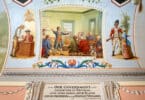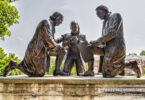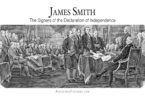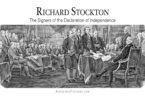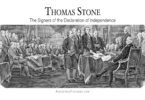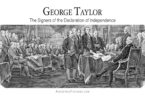Carter Braxton may not be a well known Founding Father, but he was an important one, especially in his home state of Virginia, and he left a family and political legacy that is still intact today. Carter was born in 1736 on Newington Plantation, located in King and Queen County, Virginia. His mother, Mary Carter, died shortly after he was born, and local reports at the time wrongly announced that the infant Carter had gone on to heaven with her. Yet, he was very much alive, and now part of a wealthy and influential family on both his paternal and maternal sides.
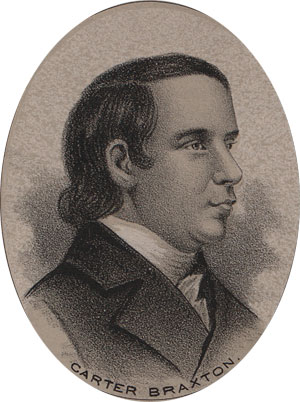
He was the grandson on his mother’s side of King Carter, a man who was one of the richest and most powerful landowners in Old Virginia (Virginia before the American Revolution). King gave his youngest daughter, Mary, the princely sum (for that time) of 2,000 pounds when she became engaged to George Braxton, Jr, Carter’s father. This money had been bequeathed to Mary in King’s will, to be given to her upon her engagement, and she became engaged to George only five months after her father had passed away. Yet, her marriage to George was so short that the full sum of the money had not yet been paid to her when she herself passed away after giving birth to Carter.
On Carter’s father’s side, his paternal grandfather, George Braxton, Sr., was one of the top one hundred largest landowners in the Northern Neck part of Virginia. George Sr was also an influential politician in Virginia, owned at least one ship that traded in the West Indies and elsewhere, and was a commissioned agent for selling slaves to other Virginians. George Sr died when Carter was twelve, and his father, George Jr, took his father’s place as a delegate for King and Queen County. However, George Jr died not long after taking this post, leaving Carter and his slightly older brother George as orphans who were still minors. The powerful Speaker of the House of Burgesses in Virginia at the time, John Robinson, took custody of Carter and his brother, a job he shared with Carter’s family neighbor, Humphrey Hill. Carter’s brother inherited the family home of Newington, as well as a treasure trove of land in King and Queen County and in Essex County, Virginia.
Carter attended the College of William and Mary like his father and brother and followed the tradition of the men in his family of marrying young, at nineteen years old, to a wealthy heiress. The lady in question was Judith Robinson, the niece of John Robinson, the House of Burgesses Speaker, and Carter’s guardian. Sadly, like Carter’s mother, Judith died soon after the marriage, only two years into it, in fact, and also in childbirth, like his mother. Also like Carter’s mother, his young wife had given him two children before she passed away, daughters Mary and Judith. After losing his wife, Carter sailed to England for the next two years.
When Carter returned from England, he sold the home where he had lived with Judith, and remarried. His new wife was another woman from a wealthy family, Elizabeth Corbin. She was the eldest daughter of Richard Corbin, who was the Deputy Receiver General for His Majesty’s Revenues in Virginia. She brought a 1,000-pound dowry to the marriage.
After remarrying, Carter bought a schooner ship and began engaging in the maritime trade business. He also owned a variety of plantations around Virginia, thanks to his inheritances from his father. Those plantations had slaves, and there are no records that Carter ever freed any of them, and he did not leave a known will that would mention any such a thing, either. In fact, researchers estimate that when Carter died, after selling some of his father’s and brother’s properties after they passed away, and after paying off his own debts, that his estate still owned about 12,000 acres of land and 165 slaves. Interestingly, ever since the end of the Civil War, most people in the United States with the name Carter Braxton (and there are some) have been African-Americans, and are assumed to be descendants of slaves on Carter’s plantations, or perhaps of Carter himself.
Carter also became a politician, as the other men in his family had done, joining the House of Burgesses as a representative from King William County in 1761. Also, Carter served as a sheriff for the county, a colonel in its militia, and as a vestryman of St. John’s Church. Carter was considered to be a moderate and sometimes conservative politician. Yet, he occasionally displayed more liberal, revolutionary tendencies, such as when he signed the First Virginia Association to protest the Townshend duties on tea and other products from Great Britain. While he signed the official protest, he did not join the later boycott of these imported goods.
During the American Revolution, Carter was viewed as a moderate who would prefer to stay joined to Great Britain, but who was not a loyalist to them. Carter continued his political career during the pre-Revolutionary times when sentiment was turning against Great Britain. He served sixteen times in the House of Burgesses until Lord Dunmore dissolved it. He was also a county delegate to all fie of the Virginia Convention sessions and became part of the patriots’ Committee of Safety in Virginia in 1774. He also was the chair of a legislative committee assembled to discuss legal penalties against British loyalists.
Carter was elected to the Continental Congress in 1775 after one of the delegates crossed. He served on the Congress from October of 1775 to August of 1776, just after the Declaration of Independence was approved. It was in that capacity that Carter made history by signing the document that officially kicked off the American Revolution.
Though he did sign it, Carter believed that declaring independence from Great Britain was a premature move on the Congress’s part. He let the other members of the Congress know his thoughts on the matter by publishing a pamphlet on the subject, which was intended as a counterpoint to John Adams’s Thoughts on Government pamphlets.
After serving on the Congress, he returned to Virginia, where he and fellow Virginian Congressional delegate Thomas Jefferson were formally thanked for their service. Carter continued to serve in the House of Burgesses after the Continental Congress, until the House was dissolved, with particular areas of political concern for him being debt and tax moratoriums, and other forms of financial assistance for the people of Virginia.
Biographers have estimated that Carter Braxton may be the Founding Father with the most descendants today, as he had possibly as many as sixteen children with his second wife, along with the two daughters from his first wife. These children each had many descendants of their own, many of whom were as politically active as Carter himself and kept the family an important one in Virginia politics until after the Civil War.
Carter passed away in 1797 after a series of strokes, some of them while serving in political office, even during sessions in those offices. His wife survived him to 1814 and was heavily praised in her obituary for the assistance and comfort she’d given him during his last few years on this planet. It is possible that Carter was buried at Chericoke, a family plantation that the Braxton family still owns today. Yet, the graves of the family that was on the property were moved to Hollywood Cemetery in 1910, and at that time, Carter’s remains could not be found. It is possible that he was overlooked and is still on the property, or that he was buried somewhere else entirely, and no one recorded the location. A monument was put up for him in Hollywood Cemetery, anyway.
Braxton County was named in his honor, though it later became part of the new state of West Virginia. A WWI ship was named for him, as well. The site of his old family home, Newington, became an archaeological site and was named to the National Register of Historic Places in 2010.

